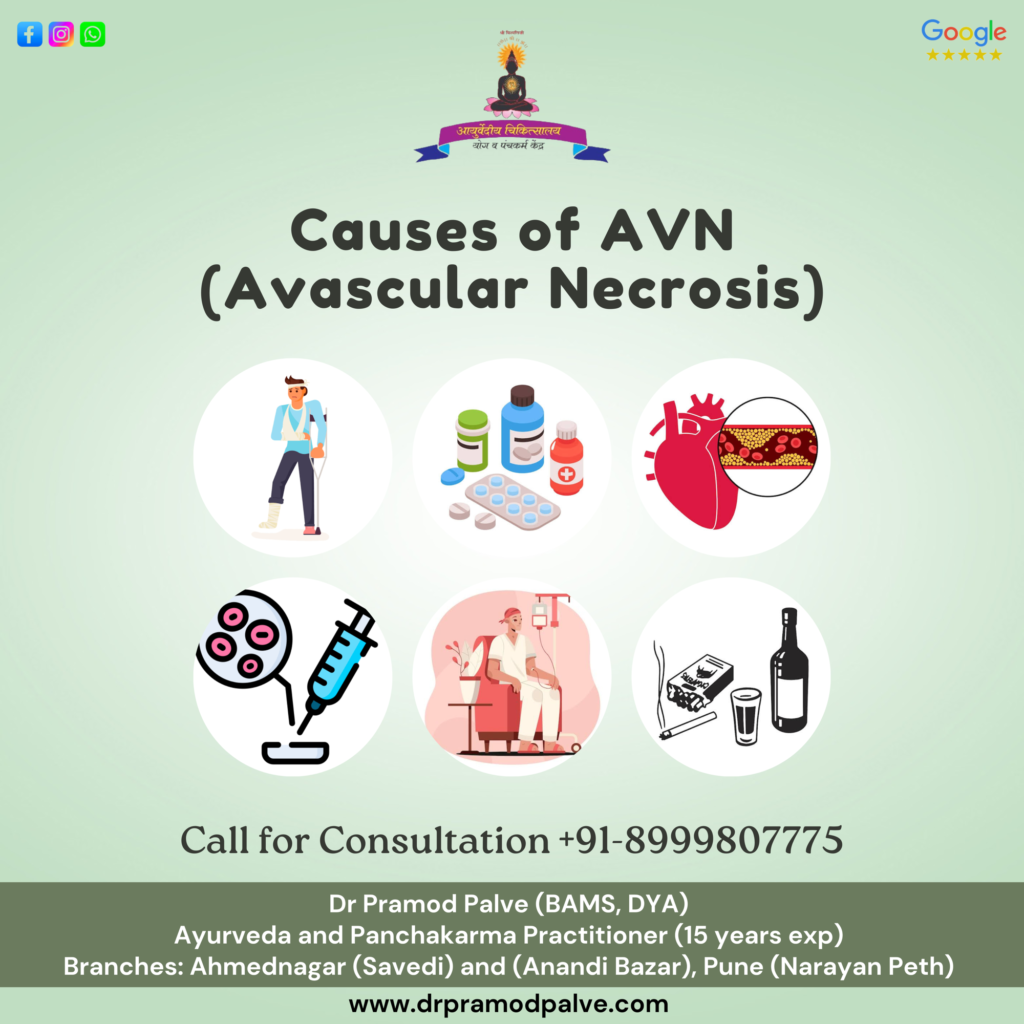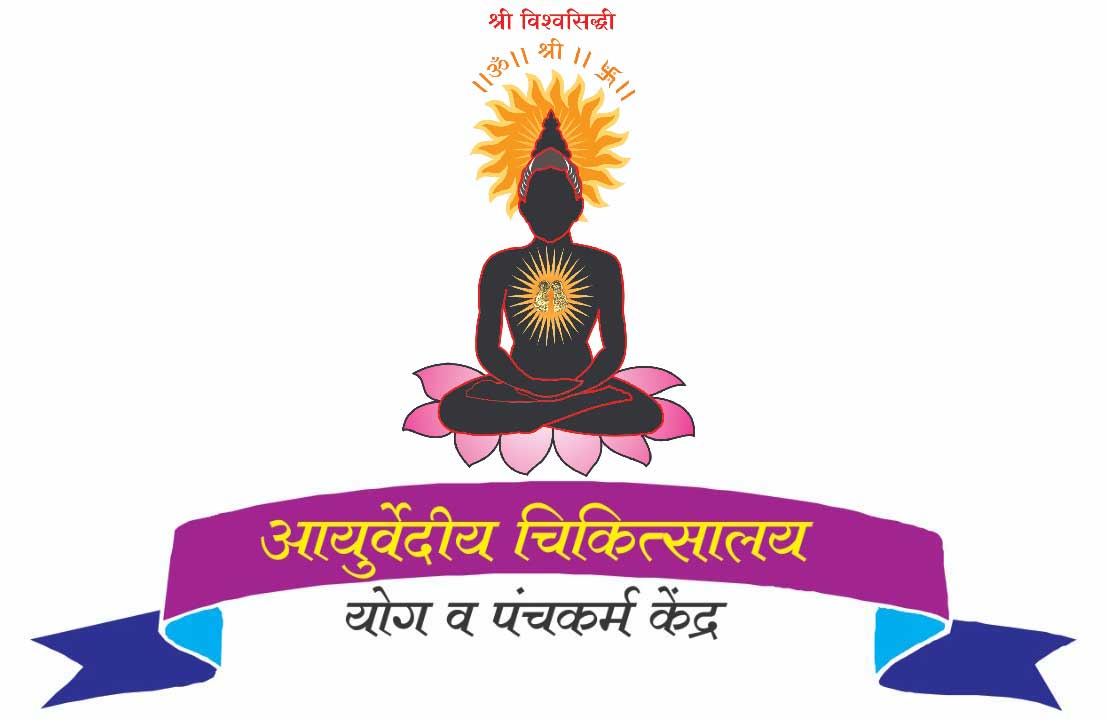Introduction
Avascular Necrosis (AVN), also known as osteonecrosis, is a debilitating condition characterized by the death of bone tissue due to a lack of blood supply. This condition can lead to pain, limited mobility, and joint collapse if left untreated. Understanding the causes of AVN is crucial for early diagnosis and effective management. At Vishwasiddhi Ayurveda & Panchkarma Centre, located in Ahmednagar and Pune, Maharashtra, Dr. Pramod Palve and his experienced team specialize in treating AVN using holistic Ayurvedic and Panchakarma therapies. With over 15 years of expertise, Dr. Palve offers a comprehensive approach to managing AVN, emphasizing natural and non-invasive treatments.
Understanding AVN (Avascular Necrosis)
AVN occurs when the blood flow to a bone is interrupted, leading to the death of bone tissue. This interruption can be caused by a variety of factors, ranging from trauma to certain medical conditions. As the bone tissue dies, it can weaken, collapse, and cause joint dysfunction. The most commonly affected areas include the hip, knee, shoulder, and ankle.
Causes of AVN

- Trauma or Injury
- Fractures and Dislocations: Significant trauma such as fractures or joint dislocations can damage the blood vessels that supply the bone, leading to AVN. This is particularly common in the hip joint following a hip fracture.
- Joint Surgery: Surgical procedures involving joints can sometimes impair blood supply to the bone, increasing the risk of AVN.
- Medical Conditions
- Chronic Diseases: Conditions such as diabetes, lupus, and sickle cell anemia can affect blood flow and contribute to the development of AVN.
- Blood Disorders: Blood clotting disorders can obstruct blood flow to the bone, causing AVN.
- Medications and Treatments
- Steroid Use: Long-term use of corticosteroids is one of the most common non-traumatic causes of AVN. Steroids can interfere with the body’s ability to break down fatty substances, leading to fatty deposits in blood vessels and reduced blood flow.
- Chemotherapy and Radiation: Treatments for cancer, such as chemotherapy and radiation therapy, can impair blood supply to bones and increase the risk of AVN.
- Lifestyle Factors
- Excessive Alcohol Consumption: Chronic, heavy alcohol use can lead to fatty deposits in blood vessels, reducing blood flow to bones and contributing to AVN.
- Smoking: Smoking can affect circulation and blood flow, which may increase the risk of AVN.
- Idiopathic Factors
- In some cases, the exact cause of AVN remains unknown. This is referred to as idiopathic AVN. Even without a clear cause, the condition can progress and require treatment.
Ayurvedic Perspective on AVN
In Ayurveda, AVN is understood as a condition resulting from the imbalance of Vata dosha, which governs movement and circulation in the body. When Vata is aggravated, it can lead to poor blood circulation and tissue degeneration. Ayurvedic treatments focus on restoring the balance of doshas and improving blood flow to the affected areas.
Panchakarma Treatment for AVN at Vishwasiddhi Ayurveda & Panchkarma Centre
At Vishwasiddhi Ayurveda & Panchkarma Centre, Dr. Pramod Palve and his team provide personalized Panchakarma treatments to manage AVN. Panchakarma, a holistic detoxification and rejuvenation therapy, plays a crucial role in restoring health and function in AVN patients.
- Vamana (Therapeutic Vomiting)
- Vamana helps remove toxins from the body, improving overall circulation and supporting the healing process.
- Virechana (Purgation)
- Virechana involves the use of herbal laxatives to cleanse the digestive system, helping to balance the doshas and improve blood flow.
- Basti (Medicated Enema)
- Basti therapy involves administering herbal decoctions and oils through enemas to cleanse the colon and rectify Vata imbalances. This is particularly beneficial for conditions like AVN, where Vata imbalance plays a significant role.
- Nasya (Nasal Administration)
- Nasya involves the administration of medicated oils or powders through the nasal passages to clear toxins from the head and neck region, supporting overall health.
- Raktamokshana (Bloodletting)
- Raktamokshana helps remove impure blood and is particularly beneficial for treating blood-borne diseases and improving circulation.
Benefits of Panchakarma for AVN
- Detoxification: Panchakarma therapies effectively remove accumulated toxins (Ama) from the body, enhancing overall health and supporting the healing process.
- Improved Circulation: By balancing the doshas and improving blood flow, Panchakarma helps restore proper circulation to the affected bones.
- Pain Relief: Panchakarma therapies help reduce inflammation and pain, providing relief for AVN patients.
- Tissue Rejuvenation: The rejuvenation aspect of Panchakarma promotes the regeneration of healthy bone tissue, supporting recovery from AVN.
- Holistic Approach: Panchakarma addresses the root causes of AVN, offering a comprehensive and natural approach to treatment.
Why Choose Vishwasiddhi Ayurveda & Panchkarma Centre?
- Experienced Practitioners: Dr. Pramod Palve, a leading Ayurveda and Panchakarma specialist with over 15 years of experience, ensures that patients receive expert care.
- Personalized Treatment Plans: The center offers customized treatment plans tailored to individual health needs and conditions.
- State-of-the-Art Facilities: Equipped with modern amenities, the center provides a comfortable and effective treatment environment.
- Comprehensive Services: From detoxification and rejuvenation to specialized treatments for chronic conditions, the center offers a wide range of Panchakarma therapies.
FAQs
- What are the early symptoms of AVN?
- Early symptoms of AVN include pain and stiffness in the affected joint, limited range of motion, and discomfort that worsens with activity. It’s crucial to seek medical attention if you experience these symptoms.
- How is AVN diagnosed?
- AVN is diagnosed through a combination of medical history, physical examination, and imaging tests such as X-rays, MRI, or CT scans. These tests help determine the extent of bone damage.
- Can AVN be prevented?
- While some causes of AVN, such as trauma, cannot be entirely prevented, lifestyle changes like reducing alcohol consumption, quitting smoking, and managing underlying health conditions can lower the risk of developing AVN.
- What is the prognosis for AVN patients?
- The prognosis for AVN depends on the stage of the disease and the effectiveness of the treatment. Early diagnosis and appropriate management, such as Panchakarma therapy, can significantly improve outcomes and prevent joint collapse.
For those seeking natural and holistic treatment for AVN, Vishwasiddhi Ayurveda & Panchkarma Centre in Ahmednagar and Pune offers expert care under the guidance of Dr. Pramod Palve. With personalized Panchakarma treatments, patients can experience significant relief and improved quality of life.
